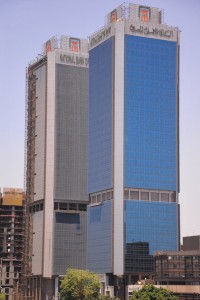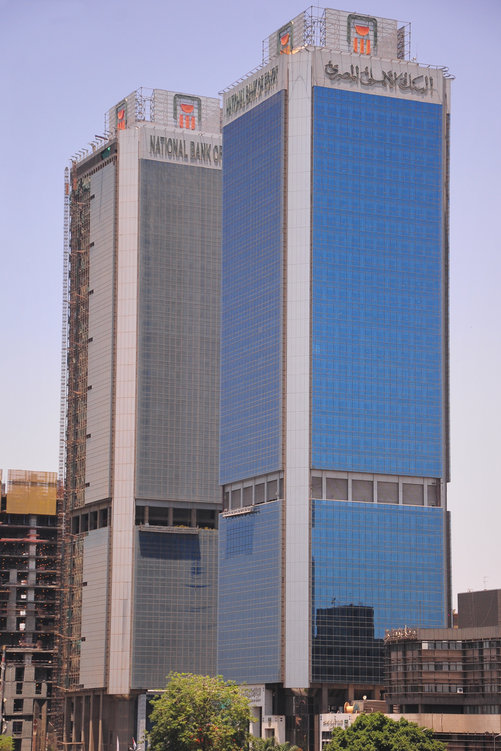
(Photo by Hassan Ibrahim)
By Ayat Al-Batawi
The rise of interest rates on bonds witnessed last week in Egypt’s banking sector has led five other banks to raise their interest rates this week.
Banque Du Caire raised the price of its interest rates on bonds to 12.5% on a quarterly basis and by 11% on a monthly basis, instead of its original 10.25% and 10%, respectively, in order to keep pace with the National Bank of Egypt (NBE), Banque Misr, and the Commercial International Bank (CIB), who all raised their interest rates last week.
The ABC Bank (Arab Banking Corporation) surprised the market when it raised the rate of return on its bonds to 13%, with bonds being sold beginning at, and in increments of, EGP 500.
Yahya Al-Agmi, president of the Retail Banking and Branches Sector for Banque Misr, stated that a number of banks sought to increase interest rates on savings bonds made in local currency, due to the recent increase in local currency available in many banks’ central infrastructures. This, he said, was done to improve the benefit and rates of return on savings in local currency.
Banque Misr has decided to increase interest rates on its savings bonds by one percentage point to 12.5% yearly, to be paid every three months as opposed to 11.5% yearly. The bank also announced the sale of new bonds beginning at, and in increments of, EGP 1,000, with the ability to exchange returns using payment cards.
He added that the policies of Banque Misr, NBE and Banque Du Caire to raise their rates of return on bonds was done out of a desire to increase liquidity and curb inflation as opposed to making profits. This he said, was done because the above banks are national banks, and did not reflect the motivations of other banks.
Raising interest rates on bonds was necessary now, he said, in order to prevent the ‘dollarisation’ and preserve the value of the local currency.
Hasan Abd al-Majid, managing director of the ABC Bank, said that the decision to raise return rates to 13% on bonds aims to encourage the increase in the amount of savings made in local currency, which had decreased significantly in recent months.
He said this was also done to curb inflation and strengthen the value of the Egyptian pound in comparison to the American dollar.
Hazem Hegazi, president of NBE’s retail banking and branches sector, said that their decision to raise the rate of returns on bonds was done to pave the way for other Egyptian banks to do the same.
NBE had recently raised its return rates on its Platinum bonds, the bank’s primary savings instrument, by two percentage points. CIB stated that it raised the rates of return on its savings bonds for a period of three years from 10.5% to 11%, to be paid every three months.
Hegazi stated that reasons behind the rise in return rates differed from bank to bank depending on their orientation to the market.
Ahmed Abd al-Gawad, the Export Development Bank of Egypt’s administrative director for client services, stated that his bank was considering raising return rates on bonds in order to keep pace with the market. This was especially true considering the large number of bonds and diversified savings instruments which the bank possesses. He added that the decision regarding whether or not to raise rates would be made within the next several days.
Mohamed Hamdy, director of deposits for Piraeus Bank, said that his bank was also considering raising their rates of return on savings bonds, and would decide whether or not to do so by carefully studying the examples of other banks, and that doing so now would not be appropriate.
Abd al-Magid Mahya al-Din, vice president of the board of directors for the Egyptian Arab Land Bank, said that a meeting would soon be held to discuss raising interest rates on bonds, and that the bank is likely to implement this decision soon in order to keep pace with the market.
Magdi Yunan, administrative director of assets, liabilities and investment funds at the Ahli United Bank, said that any decision to raise rates on bonds was still up for discussion. He added that just because some Egyptian banks had decided to do so did not mean that all others were required to as well, saying that such a decision should be determined by each bank’s orientation with regards to the market.
He added by saying, for example, that the motivation for government banks to raise rates was different from that of private or foreign banks. These policies he said, were necessary in order to strengthen local currency and fight dollarisation.
Hamdy Azam, member of the board of directors for the Industrial Development and Workers Bank of Egypt (IDBE), said that the bank would be holding a meeting Tuesday next week in order to discuss whether or not to raise rates of returns on bonds.
Hani Mahfouz, an official with the Arab Investment Bank (AIB), said that the issue was still being discussed and that no decision had yet been reached regarding the issue within his bank.



